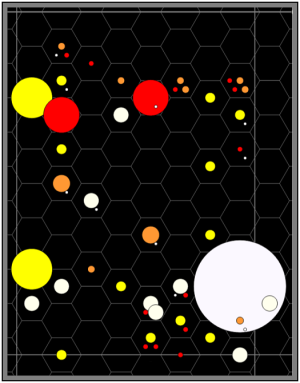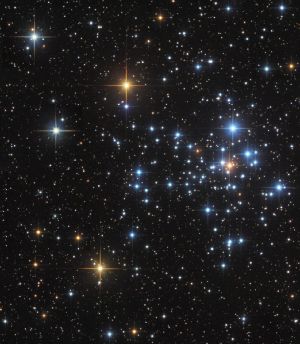Persiphus Subsector
| Persiphus Subsector | ||||||
|---|---|---|---|---|---|---|
| ||||||
| Sector | Theta Borealis | |||||
| Capital | Jelmirt | |||||
| No. of Stars | 34 | |||||
| Majority Control | Non-Aligned (NaHu) - 68% | |||||
| 2nd Control | Percavid Marches (KoPm) - 32% | |||||
Persiphus Subsector is Subsector J of Theta Borealis Sector.
- It lies within Charted Space.
- On older surveys it may be referred to as the Persiphus Quadrant.
Description (Specifications)[edit]
Persiphus Subsector is a settled and developed region within Balkanized Space.
- Some worlds have been settled for millennia.
- The resources of the subsector are being exploited.
Astrographic Features & Trade Routes[edit]
The following astrographic and commercial data has been determined:
- Most of the subsector is a standard stellar density region.
- There are no rift regions within the subsector.
- The brightest star is the unstable blue-white supergiant primary of the Theta Borealis.
- A Korsumug communications route crosses the region.
Stellar Distribution[edit]
A basic map showing the distribution and size of stars within Persiphus Subsector.
- The color corresponds to the visible color of the star, which links to its spectral classification.
- The size as shown indicates both the physical size of the object and its relative brightness.

(Chart sourced from Traveller Map).
Note that the stars as depicted are representative. Any star, no matter what its size, is a mere speck within the hex it occupies.
- Ordinary main sequence stars can barely be seen from even a hex away.
- Huge, intensely luminous giant stars can be seen from across the subsector and far beyond.
Borealis Group[edit]
The subsector forms part of the Borealis Group, a gigantic, broadly spherical cluster of stars centered on Theta Borealis Sector.
- It is a distinctive, extremely bright feature that can be easily observed from all across Charted Space.
- It is more than 40 parsecs in diameter.
- It contains an unusually high number of giant stars.
- It is the density of giant stars within the region, rather than their individual brightness, that makes the feature so prominent.
Chains of giant stars trail out from the cluster into many of the surrounding sectors.
- Persiphus Subsector forms part of the clusters core.
The night-time skies of all of the worlds across the region are studded with a panoply of colorful, intensely bright stars.
- Some are so bright that they can be clearly seen from planetary surfaces during daylight hours.
- The brightest is Theta Borealis, an unstable, violent, blue-white bright supergiant with a luminosity of around 73,000 sols.
- Other extremely bright stars within the cluster include Sigma Borealis, Tau Borealis, Epsilon Borealis, Mu Borealis, and Kappa Borealis.
- While the cluster contains many extremely luminous giant stars, Theta B is exponentially brighter than any of the others.
World Listing[edit]
Comprehensive Second Survey data for all worlds lying within Duhamel Subsector is available.
- The primary source material for all data is Traveller Map.
- Other sources may differ: some elements of the data may be contradictory or incorrect.
- Data is occasionally updated as new information becomes available.
- Scouting missions gathering reliable, verified data can receive substantial payment.
AAB library archives contain expanded data about the following systems:
Note that some Second Survey data, though only 40 years old, may already be out of date.
- Verified updated data is constantly sought.
History & Background (Dossier)[edit]
A few worlds of the region were settled sometime after -1900 by humans originating in the Rule of Man. These isolated settlements survived and even prospered during the Long Night, becoming known as the the Verstand-Jugartha colonies. They served as the focus for waves of settlers originating in what later became the Imperial core, who had gained access to Sylean jump technology and were seeking empty worlds of their own.
Finding their destination worlds already thoroughly governed and relatively heavily populated, later waves of arrivals carried on to spinward, seeking other habitable worlds within the region that they could claim. Although this slow trickle of humanity had effectively ceased by the end of the third century, by the beginning of the twelth century some of these outposts had grown into heavily populated worlds with distinctive cultures of their own. Among these the Nh'ekul culture is one of the most prominent.
Polity Listing[edit]
The following polities can be found within this subsector:
Native Sophonts[edit]
No Sophont species are believed to have originated in this area.
Demographics[edit]
Significant populations of the following races (sophont species) reside within this area:
- Humaniti (Human races)
- Non-Human Races
- Aslan (Major Race). A few Ihatei scouts exploring to spinward.
Subsector Timeline[edit]
Major events that have affected this subsector and the wider region that it lies within:
- ca -250,000: the Ancients were likely active within Theta Borealis Sector.
- -5415: the Zhodani discover jump drive technology.
- -2396 / 2123AD: the first known human explorers are active in the region (a few wandering Terrans).
- ca -1900: small numbers of humans (Terrans of the Rule of Man) begin founding settlements across Theta Borealis Sector.
- -1776: the Long Night begins.
- Year 0: far to trailing, across the Great Rift, the Third Imperium is founded.
- 100s-200s: a few pioneering Imperial explorers pass through the subsector.
- 300-420: the Imperial First Survey charts the subsector.
- mid-300s: waves of humans with origins in the Imperial core begin settling within the region.
- 500s: Jaibok raiders of the resurgent Korsumug Empire become active on the Korsumug Main.
- 995-1065: the Second Survey charts the subsector.
- 1065: the Imperial Second Survey is published.
Subsector Summary[edit]
Persiphus, subsector J of Theta Borealis contains 34 worlds with an estimated population of 82 billion, a per capita income of Cr5,757, and a total economy is BCr477,058. These worlds originate an interstellar trade of BCr368 through 28 starports (8 Class A, 8 Class B, 8 Class C, 4 Class D) employing 49,625 people. Driving this interstellar trade are five Agricultural (Ag) worlds, two Non-Agricultural (Na) worlds, one Pre-Agricultural (Pa) world, five Pre-Industrial (Pi) worlds, three Rich (Ri) worlds, and two Industrial (In) worlds. The governments in Persiphus maintain two Naval bases. The average technology level is 7 (with most between 4 and 10). The highest technology level is 12 at Darwald (Theta Borealis 0928), Jelmirt (Theta Borealis 1223), Obysan (Theta Borealis 1624), Muravia (Theta Borealis 1628), and Isabit (Theta Borealis 1629).
Persiphus, subsector J of Theta Borealis contains 46 stars and 332 identified planets; 27 monostellar systems, three binary systems, three trinary systems, and one system with four or more stars. 20 of the 34 systems (58%) have native gas giants. There are no Asteroid (As) belts, one Desert (De) world, one Garden (Ga) world, one Ice-capped (Ic) world, two Poor (Po) worlds, three Vacuum (Va) worlds, and five Water (Wa) or Ocean (Oc) worlds.
Persiphus has an estimated population of 82 billion distributed across three High population (Hi) worlds, one Moderate population (Ph) world, 13 Non-industrial (Ni) worlds, ten Low population (Lo) worlds, and one Barren (Ba) world. The highest population world is Jelmirt (Theta Borealis 1223). The population consists of 2 sophont groups.
| 2 identified sophont populations in Persiphus | |
|---|---|
Non-Aligned, Human-dominated[edit]
There are 23 Non-Aligned Human-dominated worlds in Persiphus with an estimated population of 12 billion.
Percavid Marches[edit]
The Percavid Marches has jurisdiction over 11 worlds with an estimated population of 70 billion, a per capita income of Cr6,530, and a total economy is BCr461,002. These worlds originate an interstellar trade of BCr90 through 11 starports (4 Class A, 3 Class B, 4 Class C, 0 Class D) employing 15,730 people. Driving this interstellar trade are two Agricultural (Ag) worlds, one Non-Agricultural (Na) world, no Pre-Agricultural (Pa) worlds, two Pre-Industrial (Pi) worlds, no Rich (Ri) worlds, and one Industrial (In) world. The governments in Percavid Marches maintain one Naval base. The average technology level is 9 (with most between 7 and 11). The highest technology level is 12 at Jelmirt (Theta Borealis 1223).
The Percavid Marches has an estimated population of 70 billion distributed across one High population (Hi) world, one Moderate population (Ph) world, six Non-industrial (Ni) worlds, one Low population (Lo) world, and no Barren (Ba) worlds. The highest population world is Jelmirt (Theta Borealis 1223). The population consists of 2 sophont groups.
- The Percavid Marches subsector capital of Persiphus is Jelmirt (Theta Borealis 1223)
References & Contributors (Sources)[edit]
| This article is missing content for one or more detailed sections. Additional details are required to complete the article. You can help the Traveller Wiki by expanding it. |
- J. Andrew Keith, Marc Miller, John Harshman. Aslan (Game Designers Workshop, 1984), IBC. (named but no further date)
- Bill Bledsaw. Theta Borealis Sector (Group One, 1981), TBD.
- Peter G. Celella, James Holden. Solomani & Aslan (Digest Group Publications, 1991), 11,50. (dot map provided)
- Author & Contributor: Jo Grant of CORE (generated data)


